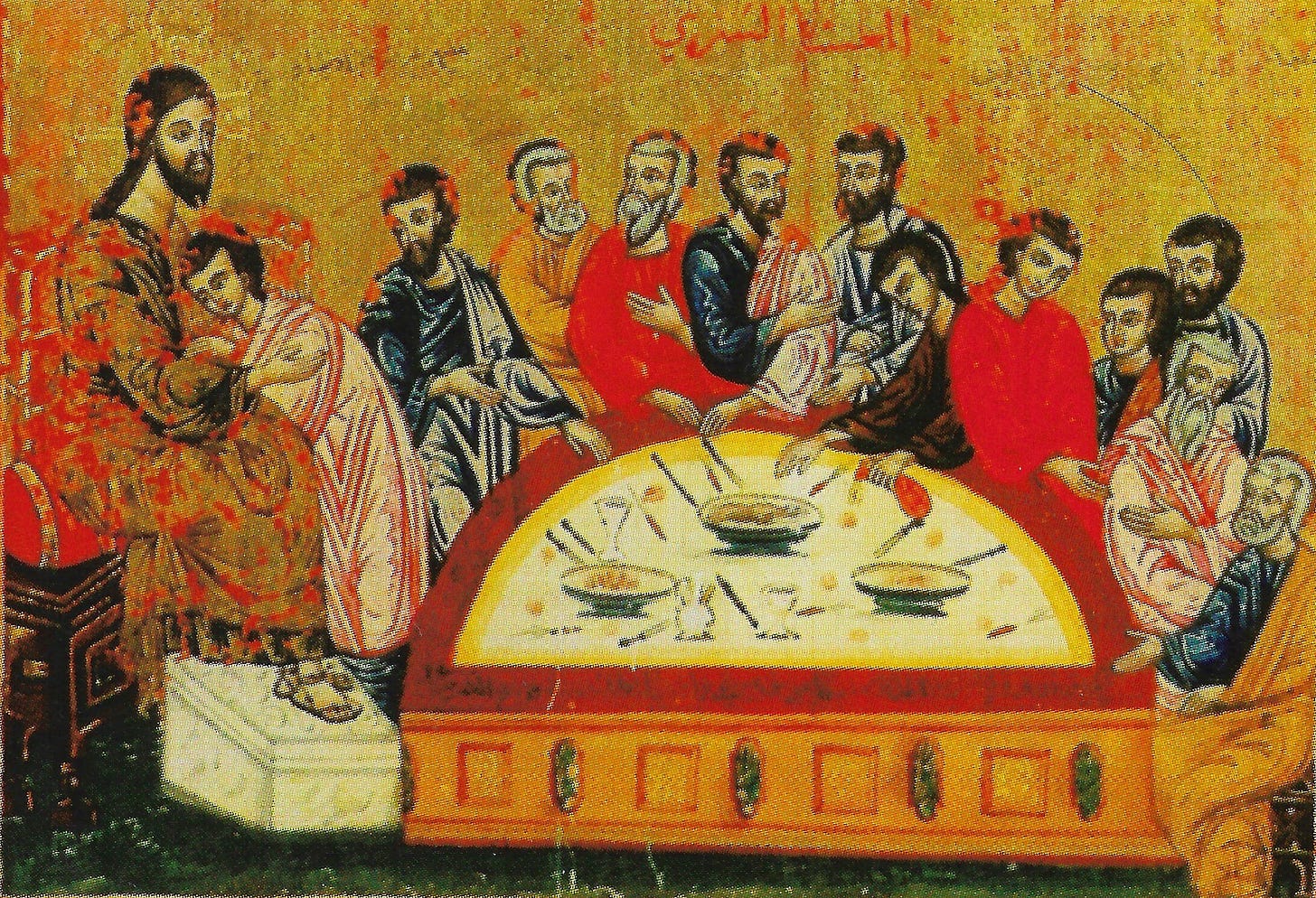Monday Devotional : An Intimate Betrayal (Mark 14:12-21)
Judas and the fulfillment of God's plan
On the first day of Unleavened Bread, when the Passover lamb is sacrificed, his disciples said to him, “Where do you want us to go and make the preparations for you to eat the Passover?” So he sent two of his disciples, saying to them, “Go into the city, and a man carrying a jar of water will meet you; follow him, and wherever he enters, say to the owner of the house, ‘The Teacher asks, Where is my guest room where I may eat the Passover with my disciples?’ He will show you a large room upstairs, furnished and ready. Make preparations for us there.” So the disciples set out and went to the city, and found everything as he had told them; and they prepared the Passover meal.
When it was evening, he came with the twelve. And when they had taken their places and were eating, Jesus said, “Truly I tell you, one of you will betray me, one who is eating with me.” They began to be distressed and to say to him one after another, “Surely, not I?” He said to them, “It is one of the twelve, one who is dipping bread into the bowl with me. For For the Son of Man goes as it is written of him, but woe to that one by whom the Son of Man is betrayed! It would have been better for that one not to have been born” (Mark 14:12-21).
Betrayal by those we love is one of the hardest things to bear in this life. Jesus knows that pain. He was betrayed by one of his closest friends, one of his inner circle. Judas knew Jesus personally. He had learned from him, walked with him, and broken bread with him. He was one of those empowered by Jesus to preach the gospel, cast out demons, and heal the sick. Nevertheless he turned against Jesus, and he did so of his own free will.
In 11:2-6, Jesus directs his disciples to acquire a donkey for him to ride into Jerusalem. Now he directs them to make preparation for the Passover meal. In both cases, he knows exactly what will happen. He is a prophet and more than a prophet. His next prophecy, however, is troubling: “One of you will betray me.” In fact, the betrayal of Jesus has already begun. After Jesus’ anointing at Bethany (14:3-9), Judas went to the chief priests for the specific reason of betraying Jesus. They offered him money, and “he began to look for an opportunity to betray him” (14:11).
On hearing that one of them will betray him, Jesus’ disciples began to be “distressed,” as the NRSV puts it. The word lupeō connotes sadness, grief, and heaviness. As Strauss points out, “Meals were rituals of social status in the Mediterranean world, and to share a meal indicated trust and friendship. The point here is that this is the worst kind of betrayal, coming from a close friend and confidant” (Mark L. Strauss, Mark, 2014). What Jesus is saying must be hard for them to comprehend (except for Judas). “Surely not I,” they all respond. And yet all of them will abandon Jesus in the time of trial.
“It is one of the twelve, one who is dipping bread into the bowl with me,” Jesus responds, highlighting the intimacy of the betrayal. It will be one of his inner circle, one with whom he even shares the Passover meal. Yet this is more than an affront against an intimate friend. It is treason against the Son of Man, God’s representative on earth, the very embodiment of Israel. “For For the Son of Man goes as it is written of him.” Though Jesus does not cite specific biblical passages, Daniel 7 is surely churning in the background here. Psalm 41:9 is also likely in mind: “Even my bosom friend in whom I trusted, who ate of my bread, has lifted the heel against me.” Likewise, Isaiah 53, one of the Servant Songs so important to early christological reflection, might also be in play: “He was despised and rejected by others, a man of suffering and acquainted with infirmity” (Isa 53:3).
Jesus fulfills prophecy through his death, but that does not exonerate his betrayer: “Woe to that one by whom the Son of Man is betrayed! It would have been better for that one not to have been born.” Somehow, in a way that is not entirely clear, two forces are at work here. One is the divine plan of salvation. The other is the will of the betrayer to turn against Jesus. They function together, though we must distinguish between them. Judas’s act of betrayal is truly evil, but, to paraphrase Joseph, what people mean for evil, God can use for good (Gen 50:20). God took an act of treachery and used it to bring salvation to all creation.
God is constantly at work in the world exchanging a garland for ashes, the oil of gladness for mourning, a mantle of praise for a faint spirit (Isa 61:3). We are culpable for our actions, but we can never finally thwart God’s redemptive purposes. The worst and best are yet to come in Mark’s story.
Prayer: God, forgive me for the ways I have betrayed you. Forgive me for the times I have abandoned you. Create in me a clean heart and put me to work within your plan of salvation.
Question:
Why doesn’t Jesus simply name his betrayer?
Do you think that each of the disciples (apart from Judas) might have secretly worried that he would be the betrayer?
How is Judas responsible for his actions if the betrayal of Jesus fulfills Scripture?





